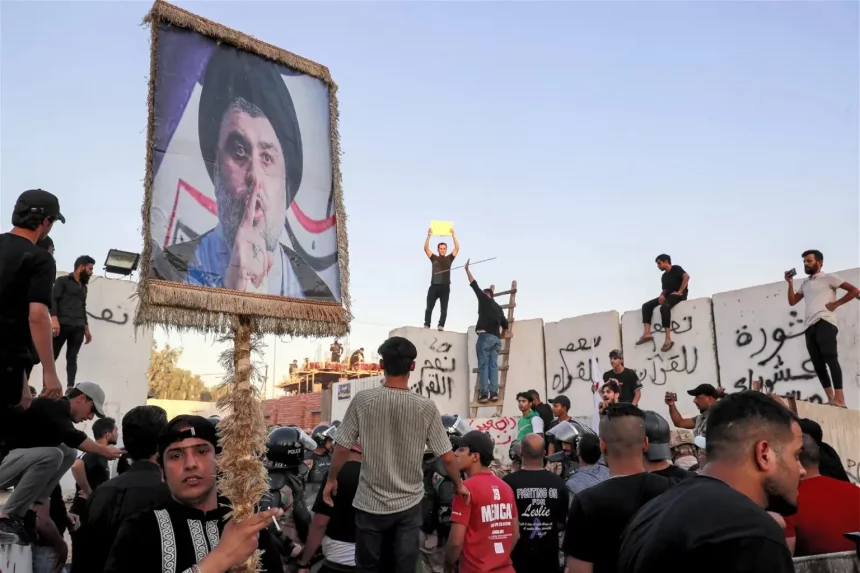Iraq has expelled the Swedish ambassador only hours after Iraqi protesters angered by the burning of copies of the Quran in Sweden stormed the Swedish embassy in central Baghdad, scaling the walls of the compound and setting it on fire.
The Iraqi prime minister, Mohammed Shia al-Sudani, also recalled his country’s charge d’affaires in Sweden, the government said on Thursday, and suspended the working permit of Swedish telecom company Ericsson on Iraqi soil, according to state media.
Early on Thursday morning, demonstrators at the embassy waved flags and signs showing the influential Iraqi Shia religious and political leader Muqtada al-Sadr, according to Al Jazeera’s Mahmoud Abdelwahed in Nasiriyah, southern Iraq.
The burning of the embassy was called by supporters of al-Sadr to protest against the second planned burning of a Quran in front of the Iraqi embassy in Stockholm on Thursday. While protesters in Sweden kicked and partially damaged a book they said was the Quran, they did not burn it as they had threatened to do.
The Finnish embassy in Baghdad is adjacent to the Swedish embassy, in an area enclosed by blast walls. Finland’s ambassador to Iraq, Matti Lassila, told the Finnish public broadcaster YLE that the staff of the Swedish and Finnish embassies were proactively evacuated on Wednesday and were uninjured.
All embassy staff were safe, the Swedish foreign ministry press office also said in a statement, condemning the attack and highlighting the need for Iraqi authorities to protect diplomatic missions.
Muslim countries react
Condemning what it called a “despicable attack” on the Quran in Stockholm, Turkey’s foreign ministry called on Sweden to take “decisive measures to prevent this hate crime” against Islam.
Meanwhile, Saudi Arabia summoned the Swedish charges d’affairs to protest against the desecration of Quran, state media reported.
Iran’s foreign ministry also summoned the Swedish ambassador in Tehran while demonstrations were planned to be held throughout Iran on Friday prayer.
Swedish media reported that Salwan Momika, an Iraqi refugee in Sweden, had organised the planned burning on Thursday.
Salwan also burned pages of a copy of the Quran in front of Stockholm’s largest mosque on June 28 during Eid al-Adha, a holiday celebrated by Muslims around the world.
That earlier incident also prompted supporters of Moqtada to storm Sweden’s embassy in Baghdad the following day.
The governments of several Muslim countries, including Iraq, Turkey, the United Arab Emirates, Jordan and Morocco issued protests about the incident, with Iraq seeking the man’s extradition to face trial in the country.
Swedish police had granted Momika a permit in line with the country’s free speech protections, but authorities later said they had opened an investigation over “agitation against an ethnic group”, noting that Momika had burned pages from the Islamic holy book very close to the mosque.
By dawn on Thursday, security forces had deployed inside the embassy and smoke rose from the building as fire-fighters extinguished stubborn embers, according to witnesses.
Most protesters had withdrawn, with a few dozen milling around outside the embassy.
Protesters have vowed to continue protesting “if any more burnings of the Quran happen”, Al Jazeera’s Abdelwahed added. The demonstrators are prepared to “take matters in their own hands” if the “Iraqi government does not dismiss the Swedish diplomatic mission immediately”, he said.
“We are mobilised today to denounce the burning of the Quran, which is all about love and faith,” protester Hassan Ahmed told the AFP news agency at the embassy.
“We demand that the Swedish government and the Iraqi government stop this type of initiative,” he said.
In the United States, the State Department strongly condemned the attack on the Swedish embassy in Baghdad and said it was “unacceptable” that Iraqi security forces did little to protect the mission.
Spokesman Matthew Miller said in a statement that freedom to protest is an essential part of democracy.
“But what occurred last night was an unlawful act of violence,” he said of the attack. “Foreign missions should not be targets of violence.”
Miller also called on the Iraqi government to live up to its obligations under international law to protect foreign diplomatic missions.
Iraq’s foreign ministry also strongly condemned the attack.
“The Iraqi government has instructed the competent security authorities to conduct an urgent investigation and take the necessary security measures in order to uncover the circumstances of the incident and identify the perpetrators of this act and hold them accountable according to the law,” the foreign ministry said in a statement.
However, a statement later on Thursday from the government said that it would sever diplomatic ties with Sweden if a second Quran burning takes place in the country.
“The Iraqi government has informed the Swedish government through diplomatic channels that any recurrence of the incident involving the burning of the Holy Quran on Swedish soil would necessitate severing diplomatic relations,” the statement from the prime minister’s office said.
According to Iraqi analyst Ihsan al-Shammari, Baghdad is not likely to take any further action on the issue, but it will be wary of the repercussions of its decision to expel the Swedish ambassador to Iraq.
“There’s a high possibility that other European countries might take action against Iraq which might isolate Iraq among European and Western states,” said Shammari, who also heads the Iraqi Center for Political Thought.



